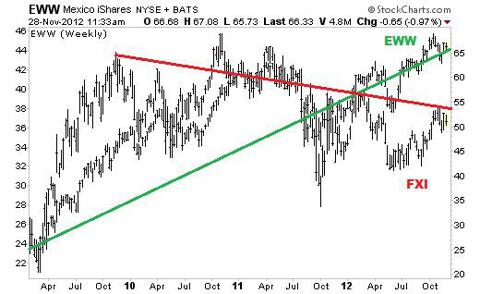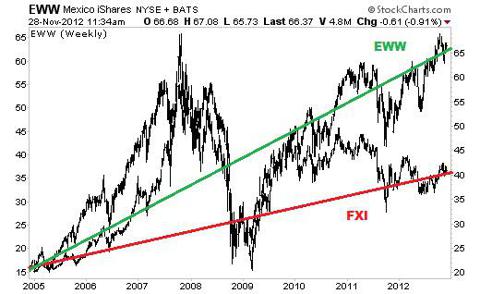As the globalization movement matures, countries like Mexico are becoming more capable and competitive. Its exports to the U.S. have grown at the expense of China over the past few years but it is questionable if such performance will be as good in the future. Here’s why. Words: 470
more capable and competitive. Its exports to the U.S. have grown at the expense of China over the past few years but it is questionable if such performance will be as good in the future. Here’s why. Words: 470
Lorimer Wilson, editor of www.munKNEE.com (Your Key to Making Money!), may have edited the article below to some degree for length and clarity – see Editor’s Note at the bottom of the page for details. This paragraph must be included in any article re-posting to avoid copyright infringement.
Orlowski goes on to say, in part:
Consumers in the U.S. may become more accustomed to “Made in Mexico” labels rather than “Made in China.” China…is losing some of its business to Mexico,….which now accounts for 14.2% of manufactured imports into the U.S….compared to just 11% in 2005, seeing its exports to the U.S. going from a high of 29.3% at the end of 2009 down to 26.4% of late. [Read: Move Over China: Competition From Mexico is Growing Rapidly – Here’s Why]
Mexico, moreover, while winning a bigger slice of the U.S. market, has diversified its customers, reducing its exports to the U.S. from 90% a decade ago…to less than 80% now. Mexico, it seems, has become the preferred center of manufacturing for multinational companies looking to supply the Americas and, increasingly, beyond.
Who in the world is currently reading this article along with you? Click here
Today, Mexico exports more manufactured products than the rest of Latin America put together – which will come as no surprise for those readers who have been watching Mexico and Mexico-oriented investments the past few years.
A comparison of two ETFs, the iShares MSCI Mexico Investable Market Index ETF (EWW) and the iShares FTSE/Xinhua China 25 Index ETF (FXI) provide an interesting perspective for investors.
In the chart above, which goes back to the stock market bottom of March 2009, we see that both ETFs have risen since the market crashed. FXI, however, peaked in late 2010 and is trading significantly lower today. EWW, on the other hand, has traded recently as high as at any other point since March 2009.
The 8-year chart below provides a more dynamic picture of the rise of EWW vs. FXI. Prior to the financial crisis, both ETFs were performing well, reflecting the general prosperity in both developed and developing economies. FXI was doing better, but then again that was expected, as the focus of emerging market investors at that time was primarily BRIC-oriented.
Today we have…an out-performing Mexico. I suspect that we will see more manufacturing coming back to the Americas…[now] that regional proximity between manufacturer and consumer is becoming a priority consideration again so, if Mexico can maintain its appeal with competitive labor costs and a reasonable regulatory environment, then we may see more exports to the U.S….[Read: Impact of U.S. Fiscal Cliff on Canada, Mexico and Much of the Developed World Would be Major]
Sign up HERE to receive munKNEE.com’s unique newsletter, Your Daily Intelligence Report
- It’s FREE
- It contains the “best of the best” financial, economic and investment articles to be found on the internet
- It’s presented in an “edited excerpts” format to provide brevity & clarity of content to ensure a fast & easy read
- Don’t waste time searching for articles worth reading. We do it for you and bring them to you each day!
- Sign up HERE and begin receiving your newsletter starting tomorrow
Conclusion
However, with significant uncertainties regarding the U.S.’ economic future, it is questionable if the performance of EWW and other Mexico-related investments will be as good in the future. A recession in the U.S. will dampen results from Mexican exporters. Caution is advised until the U.S. gets its act together.
*http://emergingmoney.com/china/mexico-could-be-the-new-china/
Editor’s Note: The above post may have been edited ([ ]), abridged (…), and reformatted (including the title, some sub-titles and bold/italics emphases) for the sake of clarity and brevity to ensure a fast and easy read. The article’s views and conclusions are unaltered and no personal comments have been included to maintain the integrity of the original article.
Related Articles:
1. Move Over China: Competition From Mexico is Growing Rapidly – Here’s Why
Mexico…is one of the most attractive investment destinations in the world for the U.S. given its good relations with the United States, geographic proximity, increasing competitiveness of its manufactured products vis-a-vis those from China, low government debt, fairly low inflation and robust foreign direct investment. [Let me explain further.] Words: 656
2. Impact of U.S. Fiscal Cliff on Canada, Mexico and Much of the Developed World Would be Major
The (relative) impact on economies around the world would be major but particularly on Canada, Mexico and to a lesser extent on some other economies in a precarious state –- the UK, Germany, China, and Japan. [The details are illustrated, country by country, in a map below. Take a look.]
3. Mexico Is One of the 10 Best Countries to Retire In – Here Are the Other 9 and the Reasons Why
Rising costs in the U.S. are driving more people to consider retirement in less expensive locales and the list of potential resting spots is long and varied. International Living compiles annual lists on the best places to retire based on things like cost of living, ease of entry, healthcare, insurance and access to amenities. [Below are their top 10.] Words: 950
4. The Top 10 Countries to Retire In – For Those on a Budget
Rising costs in the U.S. are driving more people to consider retirement in less expensive locales and the list of potential resting spots is long and varied. International Living compiles annual lists on the best places to hang the retired hat based on things like cost of living, ease of entry, healthcare, insurance and access to amenities, and the Top 10 for 2012 includes some old favorites as well as new picks. [Let’s take a look.] Words: 950
5. Top 10 Places to Live and Retire in Mexico
As an artist who is neither a real estate salesperson nor travel agent pushing an agenda, I feel it’s time to have a real discussion and look at the very best places to retire with real Pro’s and Con’s so the reader can really make an informed decions on where to go that serves their needs, interests and ambitions.
6. Mexican Attitudes Regarding Economy, War on Drugs, Emigration and Life in U.S. Not Surprising
A substantial minority of Mexicans say that if they had the means and opportunity to go live in the U.S. they would do so, and more than half of those who would migrate if they had the chance say they would do so without authorization. Words: 819
 munKNEE.com Your Key to Making Money
munKNEE.com Your Key to Making Money





